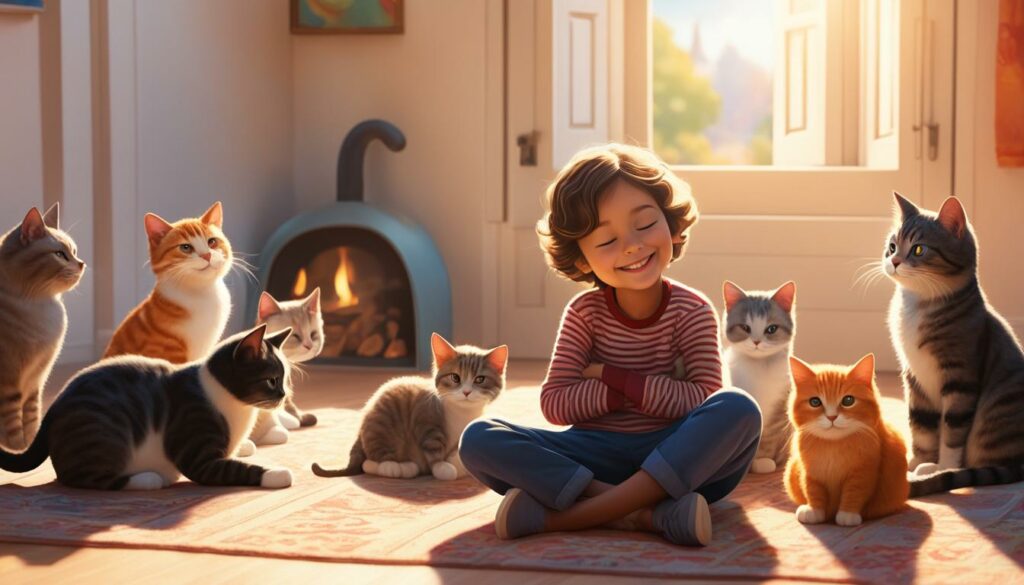Hello, I’m excited to explore the fascinating topic of the impact of cats on children’s mental health. As a pet lover myself, I understand the incredible bond that can form between children and their furry companions. But have you ever wondered if cats are more than just cuddly and adorable? Can they actually contribute to a child’s mental well-being?
In this article, we’ll delve into the importance of cats for children’s mental health. We’ll explore the therapeutic benefits of cats, the role they play in reducing anxiety in children, and how cat ownership can promote responsibility and routine. We’ll also discuss their ability to provide social comfort and the healing power of physical contact with cats. However, it’s important to acknowledge the limitations and controversies in the research on cats and children’s mental well-being. Finally, we’ll highlight the significance of seeking professional help when necessary, despite the positive impact cats can have on children.
To kickstart our exploration, let’s uncover the ways in which cats can positively influence a child’s emotional well-being, offering them love, companionship, and a sense of purpose.
Key Takeaways:
- Cats can have a positive impact on children’s mental health by reducing symptoms of anxiety and depression.
- They offer unconditional friendship, provide distraction from excessive worrying, promote responsibility and routine, offer social comfort, and provide physical contact and touch.
- Interacting with cats can promote social skills, alleviate feelings of loneliness and isolation, and foster a sense of security in children.
- Cat ownership can teach children responsibility and routine, empowering them and contributing to improved mental well-being.
- While cats can provide therapeutic relief, it’s important to seek professional help when necessary for children with severe symptoms.
The Therapeutic Benefits of Cats for Children
Cats have long been known for their ability to provide comfort and companionship, but did you know that they can also have therapeutic benefits for children’s mental health? Research has shown that cats can serve as therapy pets for children, offering a wide range of positive effects on their emotional well-being.
When children interact with cats, they often experience a sense of unconditional love and acceptance. Cats provide companionship without judgment, which can be incredibly comforting for children who may be struggling with anxiety or depression. The presence of a cat can provide a distraction from negative thoughts and help to alleviate symptoms of these mental health conditions.
Furthermore, cat ownership itself can have positive effects on children’s mental health. Taking care of a cat can provide a sense of responsibility and routine, giving children a purpose and helping them to feel a sense of control. This can be particularly beneficial for children with depression, as the structure and responsibility associated with cat ownership can help to mitigate symptoms.
In addition to the emotional benefits, interacting with cats also promotes social comfort and physical touch, both of which have been shown to have healing effects on mental health. Cats can act as a source of social comfort for children, particularly those who struggle with social anxiety. The presence of a cat can increase a child’s confidence and encourage interaction with others. Cats also provide physical touch through petting and cuddling, which has been found to reduce stress and promote relaxation.
Overall, the therapeutic benefits of cats for children’s mental health are significant. Their ability to provide companionship, love without judgment, distraction from negative thoughts, and a sense of responsibility and routine make them valuable therapy pets. Furthermore, the social comfort and physical touch that cats offer contribute to improved mental well-being in children.
“Children’s mental health can be greatly enhanced through the companionship and therapeutic benefits of cats.”
The Therapeutic Benefits of Cats for Children:
- Companionship and love without judgment
- Distraction from negative thoughts and symptoms of anxiety and depression
- Sense of responsibility and routine
- Promotion of social comfort
- Physical touch, stress reduction, and relaxation
No wonder cats have earned their place as beloved members of many families, providing not only joy but also contributing to the overall mental well-being of children.
Research on Cats and Children’s Mental Health
Research on the impact of cats on children’s mental health is limited but shows promising results. Cats have been found to reduce anxiety and provide emotional support for children. They play a crucial role in promoting mental wellness in children.
Cats can positively influence a child’s mental well-being in various ways. Firstly, they promote a sense of security. The presence of a cat can make children feel safe and protected, offering them a comforting relationship that helps alleviate feelings of fear and uncertainty.
Furthermore, cats can help alleviate feelings of loneliness and isolation. Being able to interact and bond with a cat provides children with companionship and unconditional love. This not only helps combat loneliness but also boosts a child’s self-esteem and overall mental health.
Another significant benefit of cats in promoting mental wellness in children is their role in helping kids develop social skills. Cats can serve as a bridge for social interaction, making it easier for children to connect with their peers. Talking about their cat or sharing experiences with other cat owners can foster communication and improve a child’s social comfort.
However, it is important to note that further research is needed to fully understand the extensive benefits of cats for children’s mental health. As with any scientific study, more evidence is required to provide a comprehensive understanding of the role cats play in enhancing the emotional well-being of children.
Research shows that cats have a positive impact on children’s mental health. Their presence can reduce anxiety, provide emotional support, and promote a sense of security and companionship. Further research is needed to fully understand the range of benefits cats offer for children’s mental wellness.
The Role of Cats in Reducing Anxiety in Children
Cats play a significant role in reducing anxiety in children. Their presence can provide emotional support, comfort, and a sense of security. Interacting with cats has been found to lower blood pressure, calm breathing, and slow the heart rate. Additionally, cats offer unconditional love, acceptance, and companionship, which can positively impact a child’s emotional well-being and overall mental health.
The calming effect of cats on children’s anxiety has been observed in numerous studies. The gentle purring sound of a content cat can create a soothing environment, helping children feel at ease and reducing stress levels. The rhythmic act of stroking a cat’s fur releases endorphins that promote relaxation and enhance the child’s mood.
“Having a cat at home has made a tremendous difference in my child’s anxiety levels. When they start to feel overwhelmed, they seek comfort in our cat’s presence, petting her while listening to her purring. It’s truly amazing to witness the immediate calming effect.”
– Parent testimonial
The Therapeutic Effects of Human-Animal Bonding
The bond between a child and their pet cat is a unique and special relationship. Cats offer a safe space where children can express their emotions without judgment. This companionship not only provides emotional support but also encourages healthy emotional development. Children can develop a sense of empathy, compassion, and responsibility by caring for their feline friend.
Research has shown that the interaction between humans and animals releases oxytocin, the “bonding hormone.” This hormone promotes feelings of love, trust, and relaxation, which can help reduce anxiety symptoms in children. Additionally, the physical contact and touch involved in petting or cuddling a cat can release serotonin and dopamine, neurotransmitters that contribute to a sense of well-being and happiness.
| Benefits of Cats for Children’s Mental Health |
|---|
| Reduced anxiety and stress levels |
| Promotes emotional well-being |
| Enhances mood and relaxation |
| Encourages empathy and responsibility |
| Provides a sense of security and companionship |
The positive impact of cats on children’s anxiety and overall mental health is undeniable. These furry friends contribute to the emotional well-being of children by providing love, acceptance, and companionship. Whether it’s a comforting purr or a gentle nudge, cats have a special way of soothing anxious minds and bringing joy to a child’s life.
Cat Ownership and Responsibility in Children
When it comes to teaching children responsibility, owning a cat can be a wonderful opportunity. Taking care of a cat’s daily needs, such as feeding, grooming, and showing affection, helps children develop a sense of responsibility and routine. By actively participating in the care of their feline friend, children learn the importance of being accountable for another living being.
This sense of responsibility can be empowering for children, providing them with a sense of purpose and control. Through cat ownership, they understand the significance of fulfilling their commitments and meeting the needs of another creature. This newfound responsibility can contribute to their overall growth and well-being.
Having the responsibility of caring for a cat also helps children establish a routine. Cats thrive on consistency, and their daily care activities, such as feeding and playtime, create structure in a child’s life. This routine offers stability and a sense of predictability, which can be particularly beneficial for children who struggle with uncertainty or change.
Moreover, the act of caring for a cat can have a positive impact on children’s mental health. The bond and connection they form with their feline companion can provide emotional support and comfort. When children know they have a furry friend waiting for them at home, they often feel a sense of security and companionship. This sense of connection can help alleviate feelings of loneliness and contribute to improved emotional well-being.
The Benefits of Cat Ownership and Responsibility in Children:
| Benefits | Description |
|---|---|
| Teaches Responsibility | Owning a cat helps children learn to fulfill their responsibilities and be accountable for another living being. |
| Establishes Routine | Caring for a cat creates a sense of structure and routine in a child’s life, offering stability and predictability. |
| Provides Emotional Support | The bond between a child and their cat offers emotional support and comfort, alleviating feelings of loneliness. |
Through cat ownership, children not only become more responsible but also experience the joy and rewards of taking care of another living being. This experience can foster empathy, compassion, and a deeper understanding of the needs and emotions of animals. The bond formed between a child and their cat can be a source of lifelong memories and lessons.
Cats as Companions for Social Comfort
For children with social anxiety, cats can serve as valuable companions, providing social comfort and support. The presence of a cat can boost a child’s confidence, encouraging them to interact with others and overcome social barriers.
One of the ways cats facilitate social interaction is by serving as a common topic of conversation. Children with cats often have interesting stories to share with their peers, such as playful antics or funny behavior. These stories can act as icebreakers, making it easier for children to connect with their classmates and forge new friendships.
Furthermore, the act of caring for a cat can also enhance a child’s social skills. Feeding, grooming, and playing with a cat requires responsibility and empathy, traits that are essential in building healthy relationships with others. As children develop a nurturing relationship with their feline companions, they learn valuable lessons about love, patience, and understanding, which they can apply to their interactions with their peers.
The presence of a cat can encourage social interaction by serving as a common topic of conversation and helping children develop empathy and responsibility.
Numerous studies have highlighted the positive impact of pet ownership on social well-being. In a study conducted by the University of Lincoln, researchers found that children who had a strong attachment to their pets exhibited higher levels of social competence and empathy. Cats, in particular, were shown to provide emotional support and comfort, creating an environment where children felt safe and accepted.
Benefits of Cats for Children with Social Anxiety:
- Increased confidence and self-esteem
- Improved social skills and empathy
- Enhanced ability to connect with others
- Reduced feelings of loneliness and isolation
- Empowering sense of companionship and belonging
By offering companionship and comfort, cats can help children with social anxiety navigate social situations with greater ease. Their non-judgmental presence and unconditional love provide a sense of security and acceptance, empowering children to overcome their fears and form meaningful connections with others.
| Benefits of Cats for Children with Social Anxiety | How Cats Help |
|---|---|
| Increased confidence and self-esteem | Cats provide a safe and non-judgmental environment for children to express themselves, leading to increased self-confidence. |
| Improved social skills and empathy | Caring for a cat teaches children important social skills, such as empathy, responsibility, and communication. |
| Enhanced ability to connect with others | The presence of a cat can serve as a catalyst for social interaction, making it easier for children to connect with their peers. |
| Reduced feelings of loneliness and isolation | Cats offer companionship and emotional support, providing comfort and alleviating feelings of loneliness and isolation. |
| Empowering sense of companionship and belonging | The bond between a child and their cat creates a sense of companionship and belonging, enhancing emotional well-being. |
The Healing Power of Physical Contact with Cats
Physical contact, such as petting a cat, has a profound impact on children’s mental health and wellbeing. It offers therapeutic benefits that can reduce stress, promote relaxation, and release feel-good hormones in the body.
Cats are naturally warm and affectionate animals, and their physical contact can provide a sense of comfort and security for children. The act of petting a cat not only creates a bonding experience but also stimulates the release of oxytocin, a hormone that is associated with feelings of love and attachment.
This touch therapy has been shown to have a calming effect on children, helping to alleviate symptoms of anxiety and depression. The gentle and rhythmic motion of stroking a cat can lower heart rate, reduce blood pressure, and induce a sense of relaxation.

Furthermore, physical contact with cats can also improve children’s social and emotional development. It teaches them empathy, compassion, and responsibility, as they learn to understand and respect the needs and boundaries of another living being.
The healing power of physical contact with cats extends beyond the immediate moment of interaction. Regularly spending time with a cat can have long-term benefits for children’s mental health, fostering a sense of companionship and emotional support that can positively impact their overall well-being.
Incorporating cats into the lives of children can significantly contribute to their mental health and provide them with a source of comfort and affection. The therapeutic benefits of petting cats and the emotional connection they offer make them invaluable companions for children.
Limitations and Controversies in Cat Studies and Children’s Mental Health
The research on the impact of cats on children’s mental health is limited and has produced mixed results. Some studies suggest that cat ownership is associated with more mental health problems in children, while others highlight the benefits of cats for emotional well-being. The limitations and controversies surrounding this research have sparked discussions among experts in the field.
“The relationship between cats and children’s mental health is not yet fully understood. While some findings support the positive impact of cats on emotional well-being, other studies present contrasting evidence that suggests potential risks.” – Dr. Emily Thompson, Child Psychologist
A major limitation in these studies is the lack of controlled experiments. Many rely on self-reporting or observational data, which may be influenced by a variety of factors such as individual differences, cultural backgrounds, and other environmental variables. This makes it challenging to establish a causal relationship between cat ownership and children’s mental health outcomes.
Furthermore, the age of the child and the behavior of the cat can also play a significant role. Younger children may have different reactions and interactions with cats compared to older children. Additionally, cats with calm and friendly temperaments may have different effects on children’s mental well-being compared to more unpredictable or aggressive cats.
Potential Confounding Factors
Confounding factors, such as the overall household environment, parenting styles, and socioeconomic status, can also impact the outcomes of these studies. It is challenging to isolate the specific influence of cats on children’s mental health when other variables are also at play.
Moreover, the controversy surrounding cats and children’s mental health research arises from the potential risks associated with cat ownership. Some studies have suggested a link between cat ownership and increased risk of mental health problems, such as asthma and allergies, in children. However, further research is needed to establish a clear connection and understand the underlying mechanisms.
| Limitations in Cat Studies and Children’s Mental Health Research | Controversies in Cat Studies and Children’s Mental Health Research |
|---|---|
|
|
While the limitations and controversies in cat studies and children’s mental health research call for caution in interpreting the findings, it is essential to acknowledge the potential benefits that cats can bring to children’s emotional well-being. Further research is needed to address these limitations and provide a clearer understanding of the complex relationship between cats and children’s mental health.
Seeking Professional Help for Children’s Mental Health
While cats can provide therapeutic relief for children with anxiety or depression, it is important to recognize that professional assistance is crucial for children who are experiencing severe symptoms. While the presence of a cat can offer comfort and companionship, it may not be sufficient to address the complex needs of a child struggling with mental health issues.
Adolescent therapy can offer additional care and support for children with anxiety or depression. Through therapy, children can explore their emotions, develop coping mechanisms, and gain valuable insights into their mental well-being. A professional therapist can provide guidance, tools, and techniques designed to address specific concerns and promote positive mental health outcomes.
It is important for parents and caregivers to acknowledge when their child’s mental health requires professional intervention. Seeking timely and appropriate therapy can make a significant difference in the overall well-being and development of the child. A therapist can work collaboratively with the child, their family, and other healthcare providers to create an individualized treatment plan that suits their unique needs.
“A cat’s presence can offer comfort and companionship, but it may not be sufficient to address the complex needs of a child with mental health issues.”
By seeking professional help, parents and caregivers demonstrate their commitment to prioritizing the child’s mental health and providing them with the best possible care. Through therapy, children can develop a better understanding of their emotions, learn effective strategies for managing anxiety or depression, and build resilience to navigate life’s challenges.
It is essential to remember that every child’s journey towards mental wellness is unique. Professional assistance can help in identifying and addressing underlying issues while providing a safe and supportive environment for the child to express themselves freely.

Signs Your Child May Benefit from Professional Assistance
| Signs | Explanation |
|---|---|
| Severe and persistent symptoms | If your child’s anxiety or depression symptoms are intense, prolonged, and interfere with their daily functioning, professional help may be necessary. |
| Self-harm or suicidal ideation | If your child expresses thoughts of self-harm or suicide, it is essential to seek immediate professional assistance. |
| Difficulties at school | If your child’s academic performance, social interactions, or behavior at school are significantly impacted by their anxiety or depression, professional intervention can provide valuable support. |
| Withdrawal from activities | If your child has lost interest in activities they once enjoyed, avoids socializing, or isolates themselves, it may indicate the need for professional help. |
| Changes in sleep or appetite | If your child experiences significant changes in sleep patterns, such as insomnia or excessive sleeping, or exhibits changes in appetite or weight, professional assistance may be beneficial. |
Remember, seeking professional assistance for your child’s mental health is not a sign of weakness or failure. It is an act of love and commitment towards their well-being. With the right guidance and support, children can develop the necessary skills to manage their anxiety or depression and lead fulfilling lives.
Conclusion: Cats and Children’s Mental Health
Cats have a remarkable impact on children’s mental health, offering a range of benefits that contribute to their overall well-being. Through companionship, emotional support, and a sense of responsibility, cats can create a positive environment for children to thrive.
Studies have shown that cats can help reduce symptoms of anxiety and depression in children. Their presence provides comfort, alleviates stress, and promotes relaxation. Interacting with cats also encourages physical touch, which releases feel-good hormones in the body and enhances emotional well-being.
In addition to their therapeutic effects, cats offer social comfort for children with social anxiety. The companionship and unconditional love they provide can boost confidence and facilitate social interaction. Having a cat as a part of the family also encourages responsibility and routine, promoting a sense of purpose and control in children’s lives.
While more research is needed to fully understand the role of cats in children’s mental well-being, their positive influence should not be overlooked. Considering the many benefits they offer, incorporating cats into holistic approaches to supporting children’s mental health can be a valuable addition.
Source Links
- https://www.psychologytoday.com/us/blog/animals-and-us/201803/do-children-cats-have-more-mental-health-problems
- https://www.delraybeachpsychiatrist.com/5-ways-cats-are-great-therapy-for-anxiety-or-depression-in-children/
- https://modkat.com/blogs/modkat-purrr/cats-are-great-therapy-for-kids-with-depression-or-anxiety







